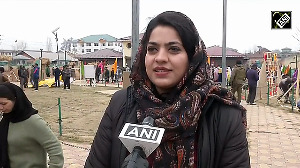It was an uphill task for the team of engineers and their workers at the Electric Multiple Unit -- the maintenance shed of Western Railway -- in Mahalaxmi, Mumbai, to literally 'reconstruct' the damaged bogies of July 11, 2006.
While they have successfully put one of the partially destroyed coaches back into service, the remaining six are still in the repairing yard.
However, these coaches will have 'something' extra when compared to other rail coaches in service at the moment. The coaches are being fitted with an extra boxing panel underneath for more stability.
"We have boxed the entire compartment to ensure better safety and security. Actually, we have fitted these compartments with iron bars underneath the coach. We are being extra cautious with the boxing and carlines," said K P Srivastav, senior section engineer, Coach Repair III, Western Railway.
Carlines is the basic metallic framework, which holds the roof of the compartment. Western Railway had to bring in these carlines from the Integral Coach Factory in Chennai. Apart from the roof and the carlines, the entire task of making components and rebuilding the damaged coaches was done at the Mahalaxmi car shed.
"This was one of the toughest assignments I have undertaken in my entire career as an engineer for the railways," said Srivastav.
Western Railway set an example post the terror strike when they successful restored the suburban services within hours, infusing life back into Mumbai's veins.
 The seven bombed-out coaches were taken to the EMU maintenance shed where they were divided among three sections -- CRI, CRII and CRIII; each under a senior section engineer and a team of 25 mechanical workers initially.
The seven bombed-out coaches were taken to the EMU maintenance shed where they were divided among three sections -- CRI, CRII and CRIII; each under a senior section engineer and a team of 25 mechanical workers initially.
According to Nusrat Husain Khan, senior section engineer CRII, "There was nothing left that could even remind us that the metal wreckage in front of us used to be a train bogey."
The bogies that came under the 11/7 terror strike were 528 A (Mahim), 8003 A (Bandra), 649 A (Khar-Santacruz), 634 A (Jogeshwari-Goregaon), 935 A (Borivali), 846 A (Mira- Bhayander) and 864 A (Matunga-Mahim). Of these, the last one has been put back into service.
"We were determined to put back the coaches into service at the earliest. And we have been working very hard throughout," said Ramanikchand Sekar Tripathi, junior engineer, grade I.
While two bogies were handed over to CRIII, both CRI and CRII got one bogie each to be repaired and put back on the tracks at the earliest.
Two other bogies were sent to the railway junkyard as they had been in service for more than 25 years, which is the prescribed service period for railway compartments.
One of the bogies (935 A) is still lying unattended as a final decision on whether it should be permanently pulled off the tracks is yet to be made.
"The bogey can actually be repaired and need not be abandoned. Well, the final decision will be made at the earliest," opined Khan.
Once the entire outer metallic body of the coaches is rebuilt, then the team of carpenters will be called in to work on the seats and panels.
Photographs: Binoy Valsan






 © 2025
© 2025